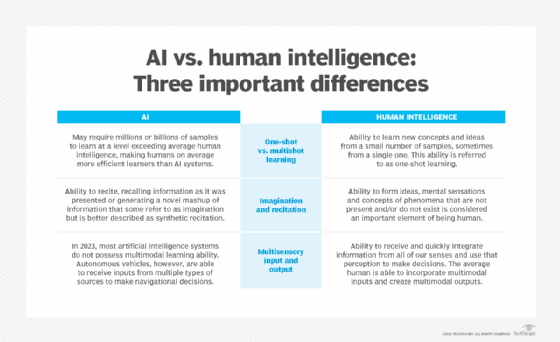Artificial intelligence vs. human intelligence: Differences explained
Artificial intelligence is humanlike. There are differences, however, between natural and artificial intelligence. Here are three ways AI and human cognition diverge.
Smartness. Understanding. Brainpower. Ability to reason. Sharpness. Wisdom.
These are terms typically used to indicate human intelligence. The broad range of connotations they encompass is indicative of the many debates that have attempted to capture the essence of what we mean when we say intelligence. For thousands of years, humans have obsessed over how best to describe and define the term. Hundreds of definitions have been created, but for much of that time, intelligence has meant a biopsychological capacity to acquire and apply knowledge and skills.
For more than a century now, the intelligence debates have been energized by a sense of competition and uncertainty about the suitability of the biopsychological element of the meaning.
Artificial intelligence (AI), or machines with the capacity to do things traditionally associated with and assumed to be within the exclusive domain of humans, has rattled human society. Since the second half of the 20th century and with a vastly accelerated pace in the last two decades, machines have exhibited the ability to learn and to apply learning in ways that only humans had been able to previously.
Human and artificial intelligence differ in significant ways, however. They are not synonymous or fungible. Even given the still intense internal contestation over what defines human intelligence and what defines artificial intelligence, the differences between the two are clear.
This article is part of
What is enterprise AI? A complete guide for businesses
Human intelligence explained: What can humans do better than AI?
Human beings tend to be superior to AI in contexts and at tasks that require empathy. Human intelligence encompasses the ability to understand and relate to the feelings of fellow humans, a capacity that AI systems struggle to emulate. Having evolved over at least 300,000 years, the species Homo sapiens developed a broad set of interactive skills -- an intelligence grounded in its development as a social animal -- that makes it adept at many forms of social intelligence. Related activities such as judgment, intuition, subtle yet effective communication, and imagination are all domains in which human intelligence is much more useful and valuable -- and simply better -- than AI in any of its present forms.
Artificial intelligence explained: What can AI do better than humans?
Artificial intelligence systems outperform the human brain in a range of important categories. AI, particularly machine learning algorithms, of which generative AI is a subset, is strikingly effective at processing and integrating new information and sharing new knowledge among separate AI models. The endurance of AI is also superior to human intelligence; machines do not require rest and do not get distracted. Machine learning is an extremely powerful tool for detecting patterns in data. In numerous examples to-date spanning medical imagery, speech, digital fraud and plagiarism, AI has proved to be much more effective at most forms of pattern recognition than the average human. Additionally, AI works at speeds well beyond those of human intelligence; in terms of pace, a machine will outperform a human at most tasks that both have been trained to complete by many orders of magnitude.
3 specific ways AI and human intelligence differ
1. One-shot vs. multishot learning
Human intelligence. One of the most miraculous qualities of humans is the ability to learn new concepts and ideas from a small number of samples, sometimes from a single one. Most humans are even able to understand and identify a pattern and to use it to generalize and extrapolate. Having been shown one or two images of a leopard, for example, and then being shown images of various types of animals, a human would be able to determine with high accuracy whether those images depicted a leopard. This ability is referred to as one-shot learning.
AI. Much more often than not, artificial intelligence systems need copious examples to achieve comparable levels of learning. An AI system may require millions, even billions, of such samples to learn at a level beyond that of a human of average intelligence. This requirement for multishot learning distinguishes AI from human intelligence. Many researchers feel that this difference is a strong basis for describing humans as being, on average, much more efficient learners than AI systems.

2. Imagination and recitation
Human intelligence. Many psychologists, philosophers and cognitive researchers deem imagination a fundamental human ability. They even go so far as to enshrine imagination as an element of what it means to be human. The quickening tempo of climate catastrophes, growing threats of potentially devastating international conflict and other looming challenges have led to continuous calls for imaginative problem-solving. The notion that human survival in the 21st century deeply depends on novel ideas has led to a mini-renaissance in thinking about human imagination and how best to cultivate it.
Definitions abound, but most consider human imagination as the ability to form ideas, mental sensations and concepts of phenomena that are not present and/or do not exist. Things that could've been, might've been or could never be are classic forms of the imaginable and are routinely conjured in the minds of virtually every human.
AI. By comparison, many researchers agree that artificial intelligence systems recite rather than imagine. Recitation can be understood as recalling information as it was presented. Computer systems are exceptionally well designed to do this. AI systems such as generative AI tools can recite in synthesized forms. When these systems are trained to draw images of various types of automobiles, they are then able to create mashups of the examples from which they learned. For example, an AI system trained on iconic automobiles could go on to generate a mashup of a 1968 Ford Mustang, a 1950 Volkswagen Beetle and a 2023 Ferrari Portofino. Although a small subset of AI researchers have described this as imagination, a more accurate description would be to call it synthetic recitation.
For more on artificial intelligence in the enterprise, read the following articles:
Top degree programs for studying artificial intelligence
Top artificial intelligence certifications and courses
Main types of artificial intelligence: Explained
3. Multisensory input and output
Human intelligence. Another comparatively striking quality of human intelligence is the ability to receive and quickly integrate information from all our senses and use that integrated perception to then make decisions. Sight, hearing, touch, smell and taste meld seamlessly and rapidly into a coherent understanding of where we are and what is happening around us and within us. The typical human is also able to subsequently respond to these perceptions with complex reactions that are based on multiple modes of sensation. In this way, the average human is able to incorporate multimodal inputs and to create multimodal outputs.
AI. In 2023, most artificial intelligence systems are unable to learn in this multimodal way. Famous AI systems, like ChatGPT, can only receive inputs in one form -- say, text. Some autonomous vehicles, however, are able to receive inputs from multiple types of sources. Self-driving automobiles currently use a variety of sensor types, including radar, lidar, accelerometers and microphones, to absorb crucial information from the environment they are navigating. Self-driving automobiles use multiple AI systems to understand these various flows of information, aggregate them and then make navigational decisions.
AI and human intelligence working together
Understood as an approach to implementing the technology, responsible AI strives to diminish the negative impacts of AI applications, especially in ethically fraught scenarios. Individual privacy; racial, gender, religious and other affiliation-based forms of discrimination; lack of transparency and notice in the use of AI; review of AI-driven decision-making: In each of these areas responsible AI efforts seek to diminish the harms AI visits on the livelihoods and wellbeing of individuals to whom it is applied. Human intelligence is far from perfect in avoiding or even minimizing such harms, but the best of applied human ethics is superior to AI, which lacks ethics as we understand it.
Keeping ethical humans in intimate proximity to AI processes and applications, especially those touching sensitive areas of human life such as health, work and autonomy, is and will likely continue to be essential for curbing ethically unacceptable outcomes. And as AI research and implementation continue apace and the practical, existential need for more applied human imagination grows, we should expect to see the two forms of intelligence increasingly brought together in human-AI teaming.
Recent polling of citizens and indications from policymakers around the world indicate a strong disinclination for turning decision-making over to even the most intelligent AI systems. But at the same time, the problems confronted by human societies presently seem to outstrip the ability of humans to find solutions in a timely manner. The central challenge will likely be to integrate the two intelligences such that the virtues of each are amplified, while respective weaknesses are diminished or erased. Some will find this prospect unnerving. But the magnitude of the global problems we confront will probably make the melding inevitable. Human-AI teaming might be not only our best hope, but one we will find irresistible.
Michael Bennett is director of educational curriculum and business lead for responsible AI in The Institute for Experiential Artificial Intelligence at Northeastern University in Boston. Previously, he served as Discovery Partners Institute's director of student experiential immersion learning programs at the University of Illinois. He holds a J.D. from Harvard Law School.







